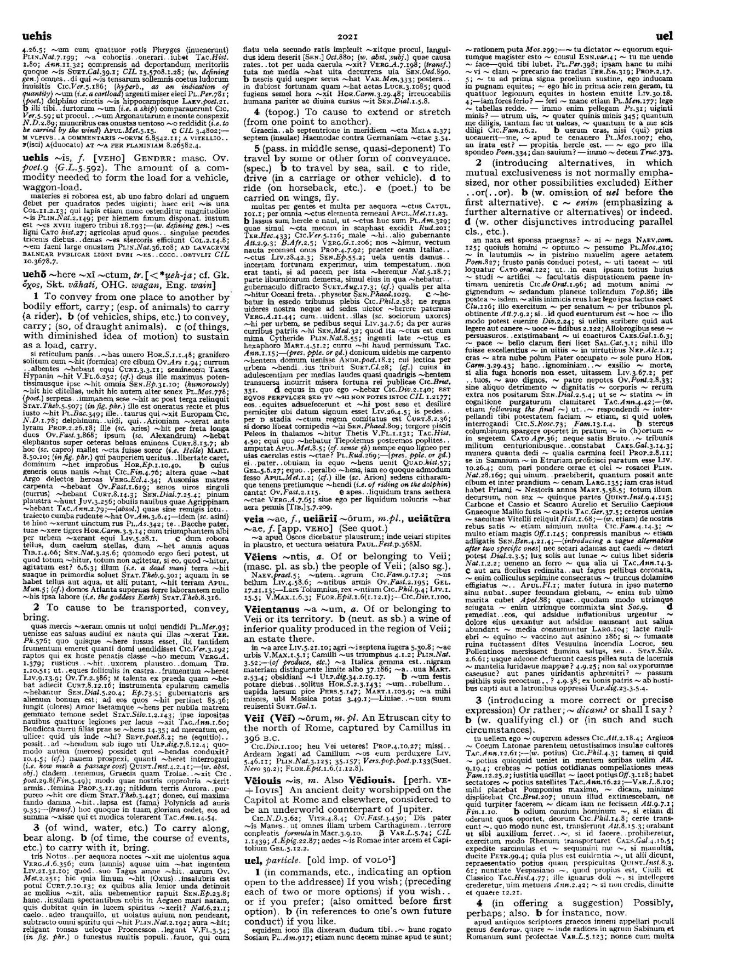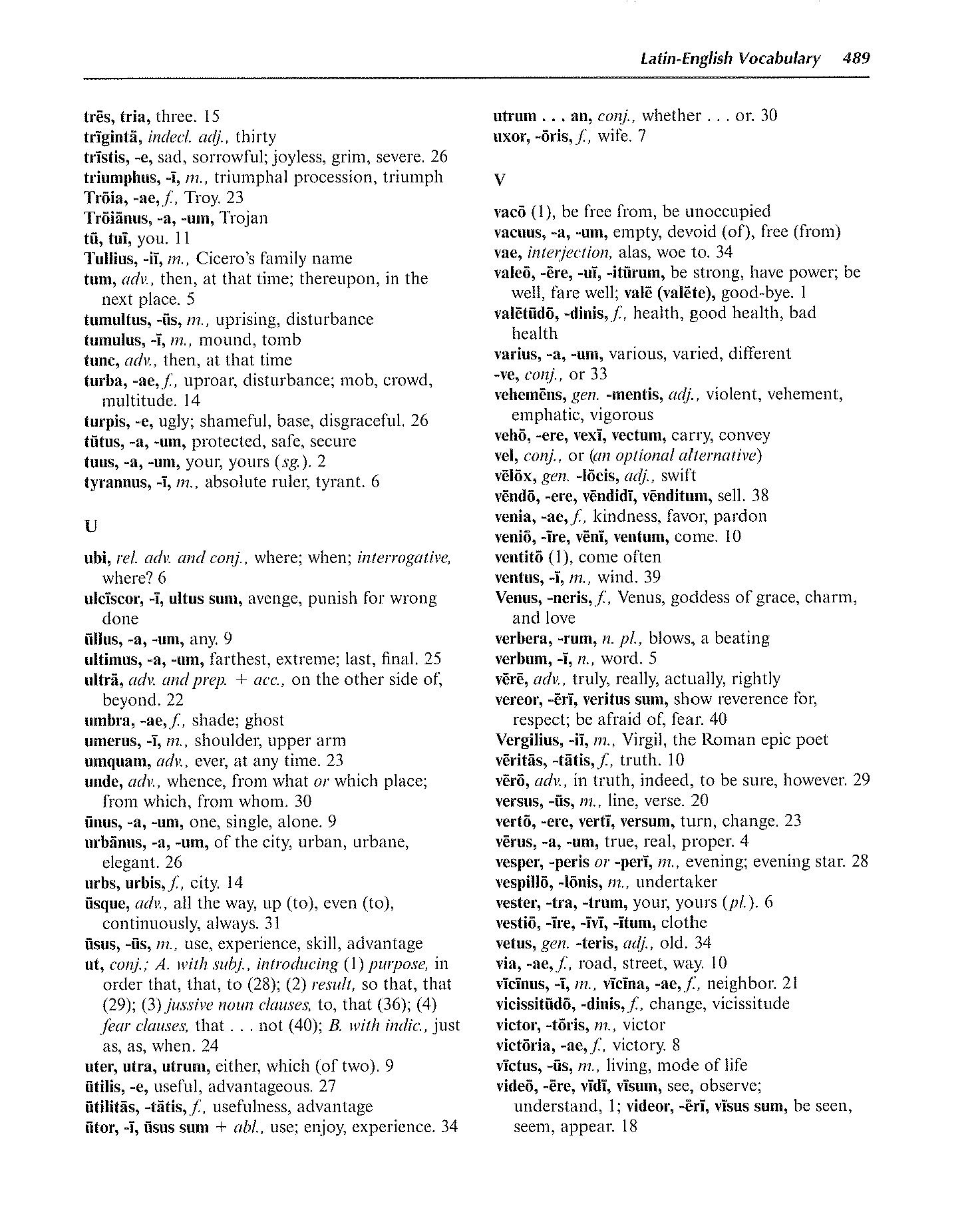
page_listing.tpl
page_subListingDetails.tpl
sub_listingDetails_style1.tpl
sub_listingDetails.title.tpl
vehere to carry
vehere is a Latin Verb that primarily means to carry.
Definitions for vehere
Wheelock's Latin
Verb
- 1
carry, convey
Oxford Latin Dictionary
Verb
- 1
To convey from one place to another by bodily effort, carry; (esp. of animals) to carry (a rider). (b) (of vehicles, ships, etc.) to convey, carry; (so of draught animals), (c) (of things, with diminished idea of motion) to sustain as a load, carry.
- 2
To cause to be transported, convey, bring.
- 3
(of wind, water, etc.) To carry along, bear along. (b) (of time, the course of events, etc.) to carry with it, bring.
- 4
(topog.) To cause to extend or stretch (from one point to another).
- 5
(pass. in middle sense, quasi-deponent) To travel by some or other form of conveyance. (spec.) (b) to travel by sea, sail. (c) to ride, drive (in a carriage or other vehicle). (d) to ride (on horseback, etc.). (e) (poet.) to be carried on wings, fly.
Sentences with vehere
Latin to English
Per alta vade spatia sublimi aethere; testare nullos esse, qua veheris, deos.Compare Go on through the lofty spaces of high heaven and bear witness, where thou ridest, that there are no gods.
Is, ad Olympia proficiscor cogitans, videor in somnus currus quadrigae veho.Compare He, when intending to go to the Olympic games, seemed in a dream to be carried in (by) a four-horse chariot.
Conjugation table for vehere
Cactus2000
| ACTIVE | |
| Indicative present | Indicative imperfect |
| vehō vehis vehit vehimus vehitis vehunt | vehēbam vehēbās vehēbat vehēbāmus vehēbātis vehēbant |
| Indicative perfect | Indicative pluperfect |
| vēxī vēxistī vēxit vēximus vēxistis vēxērunt / vēxēre | vēxeram vēxerās vēxerat vēxerāmus vēxerātis vēxerant |
| Indicative future | Indicative future perfect |
| veham vehēs vehet vehēmus vehētis vehent | vēxerō vēxeris vēxerit vēxerimus vēxeritis vēxerint |
| Subjunctive present | Subjunctive imperfect |
| veham vehās vehat vehāmus vehātis vehant | veherem veherēs veheret veherēmus veherētis veherent |
| Subjunctive perfect | Subjunctive pluperfect |
| vēxerim vēxeris vēxerit vēxerimus vēxeritis vēxerint | vēxissem vēxissēs vēxisset vēxissēmus vēxissētis vēxissent |
Infinitive present vehere Infinitive perfect vēxisse Infinitive future vectūrum esse | Imperative present vehe vehite Imperative future vehitō vehitō vehitōte vehuntō |
| PASSIVE | |
| Indicative present | Indicative imperfect |
| vehor veheris vehitur vehimur vehiminī vehuntur | vehēbar vehēbāris / vehēbāre vehēbātur vehēbāmur vehēbāminī vehēbantur |
| Indicative perfect | Indicative pluperfect |
| vectus sum vectus es vectus est vectī sumus vectī estis vectī sunt | vectus eram vectus erās vectus erat vectī erāmus vectī erātis vectī erant |
| Indicative future | Indicative future perfect |
| vehar vehēris / vehēre vehētur vehēmur vehēminī vehentur | vectus erō vectus eris vectus erit vectī erimus vectī eritis vectī erunt |
| Subjunctive present | Subjunctive imperfect |
| vehar vehāris / vehāre vehātur vehāmur vehāminī vehantur | veherer veherēris / veherēre veherētur veherēmur veherēminī veherentur |
| Subjunctive perfect | Subjunctive pluperfect |
| vectus sim vectus sīs vectus sit vectī sīmus vectī sītis vectī sint | vectus essem vectus essēs vectus esset vectī essēmus vectī essētis vectī essent |
Infinitive present vehī Infinitive perfect vectum esse Infinitive future vectum īrī | Imperative present vehere vehiminī Imperative future vehitor vehitor - vehuntor |
| PARTICIPLE | ||
| Participle present active | ||
| Nom. | vehēns | vehentēs |
| Gen. | vehentis | vehentium |
| Dat. | vehentī | vehentibus |
| Acc. | vehentem | vehentēs |
| Abl. | vehente | vehentibus |
| Participle future active | ||
| Nom. | vectūrus | vectūrī |
| Gen. | vectūrī | vectūrōrum |
| Dat. | vectūrō | vectūrīs |
| Acc. | vectūrum | vectūrōs |
| Abl. | vectūrō | vectūrīs |
| Participle perfect passive | ||
| Nom. | vectus | vectī |
| Gen. | vectī | vectōrum |
| Dat. | vectō | vectīs |
| Acc. | vectum | vectōs |
| Abl. | vectō | vectīs |
| Gerundive | ||
| Nom. | vehendus | vehendī |
| Gen. | vehendī | vehendōrum |
| Dat. | vehendō | vehendīs |
| Acc. | vehendum | vehendōs |
| Abl. | vehendō | vehendīs |
| Gerund | Supine | |
| Nom. | vehere | vectum |
| Gen. | vehendī | vectū |
| Dat. | vehendō | |
| Acc. | vehendum | |
| Abl. | vehendō | |
Data sources
Notes
- Definitions
- Frederick M. Wheelock, Wheelock's Latin, 6th ed., rev. Richard A. LaFleur (New York, NY: HarperCollins Publishers, 2005): 489.
- P. G. W. Glare, Oxford Latin Dictionary, Vols. 1-8 (Oxford: Clarendon Press, 1982): 2021.
- Word frequencies
- Christopher Francese, "Latin Core Vocabulary," Dickinson College Commentaries, last modified 2014, http://dcc.dickinson.edu.
- Paul B. Diederich, The Frequency of Latin Words and Their Endings, PhD diss., (Columbia University, 1939).
- Louis Delatte, Suzanne Govaerts, Joseph Denooz, and Etienne Evrard, Dictionnaire fréquentiel et index inverse de la langue latine [Frequency Dictionary and Inverse Index of the Latin Language] (Liège, Belgium: Laboratoire d'analyse statistique des langues anciennes de l'Université de Liège [L.A.S.L.A.], 1981): 124.
Bibliography
Allen, Joseph H. Allen and Greenough's New Latin Grammar for Schools and Colleges: Founded on Comparative Grammar. Edited by James B. Greenough, George L. Kittredge, Albert A. Howard, and Benjamin L. D'Ooge. Boston, MA: Ginn & Company, 1903.
Crystal, David. A Dictionary of Linguistics and Phonetics. 6th ed. Oxford, UK: Blackwell Publishing, 2008.
Delatte, Louis, Suzanne Govaerts, Joseph Denooz, and Etienne Evrard. Dictionnaire fréquentiel et index inverse de la langue latine [Frequency Dictionary and Inverse Index of the Latin Language]. Liège, Belgium: Laboratoire d'analyse statistique des langues anciennes de l'Université de Liège (L.A.S.L.A.), 1981.
Diederich, Paul B. The Frequency of Latin Words and Their Endings. PhD diss., Columbia University, 1939.
Francese, Christopher. "Latin Core Vocabulary." Dickinson College Commentaries. Last modified 2014. http://dcc.dickinson.edu/latin-vocabulary-list.
Gildersleeve, Basil L., and Gonzales Lodge. Gildersleeve's Latin Grammar: Third Edition, Revised, and Enlarged. 3rd ed. London, England: Macmillan and Co., 1903.
Glare, Peter G.W. Oxford Latin Dictionary. Vols. 1-8. Oxford, England: Clarendon Press, 1982.
Krüger, Bernd. "Latin Conjugation Tables." Cactus2000. Accessed May 5, 2023. https://latin.cactus2000.de/index.en.php.
Pierson, Nick. "Sound of Text." Accessed October 26, 2019. https://soundoftext.com.
Wheelock, Frederick M. Wheelock's Latin. 6th ed. Revised by Richard A. LaFleur. New York, NY: HarperCollins Publishers, 2005.
Wiktionary Contributors. "Victionarium." Wikimedia Foundation, Inc. Updated March 18, 2019. https://la.wiktionary.org/wiki/Victionarium:Pagina_prima.
Citation
Chicago (17th ed.)
Allo Contributors. "vehō, vehere, vēxī, vectum (v.) - Latin Word Definition." Allo Latin Dictionary. Last modified . Accessed February 20, 2026. http://ancientlanguages.org/latin/dictionary/veho-vehere-vexi-vectum.
Entry created on . Last updated on .







